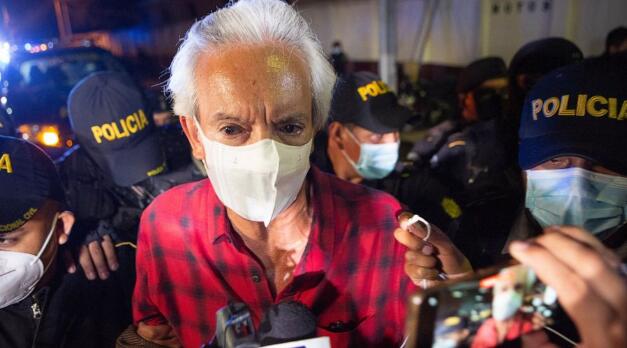Guatemalan journalist known for investigations still jailed
GUATEMALA CITY — A prize-winning Guatemalan journalist jailed on alleged money laundering charges that government critics have denounced as a pressure tactic has faced consequences for his work before.
In 2003, government agents searched José Rubén Zamora Marroquin’s home and threatened his life after he wrote a column suggesting former dictator José Efraín Ríos Montt, then president of the congress, was running a parallel government.
Five years later, armed men abducted Zamora in Guatemala’s capital before releasing him 10 hours later outside the city beaten and drugged. No one was arrested, but at the time it was believed to be in response to his newspaper’s work.
On Friday, plainclothes investigators and police with assault rifles arrested Zamora at his home. His initial appearance before a judge was canceled Monday, because the case file was apparently unavailable. The hearing was not immediately rescheduled, meaning Zamora would remain in jail.
It also meant that the details of the charges against Zamora remain a mystery. On Friday, government investigators also raided the offices of El Periodico, holding its employees in place for more than 15 hours.
Zamora founded El Periodico in 1996 and it quickly gained a reputation for uncovering government corruption. The paper made reporting scoops on the current administration of President Alejandro Giammattei and at least three of his predecessors.
Last year and this year, El Periodico published a series of investigations about the visit of Russian business people to Guatemala who met with Giammattei. The paper’s investigation accused Giammattei of accepting bribes in exchange for a concession of property in the port of Santo Tomas de Castilla.
Attorney General Consuelo Porras, who was recently reappointed by Giammattei to another term as the country’s top law enforcement official, has been sanctioned by the United States for pursuing investigations against prosecutors and judges who investigated corruption.
On Monday, authorities searched the home of one of those earlier targets, former judge Erika Aifán, who had fled to the United States after denouncing corruption.
Porras’ special prosecutor against corruption, Rafael Curruchiche, who is handling Zamora’s case, was also sanctioned by the U.S. government as an alleged obstacle to investigating corruption.
Curruchiche has said the case is focused on Zamora’s work as a businessman not as a journalist, but has offered no details.
That was difficult for others at El Periodico to reconcile because the government froze the newspape’s bank accounts.
“The bank accounts were suspended at the request of the (prosecutor’s office), with the only intention being to paralyze the finances of said media outlet, making it impossible to meet with its labor and contractual obligations,” said Gerson Ortiz, El Periodico’s news director.
Zamora’s son, Ramón Zamora, was more direct. “This is not a case against my father, it is a systematic attack against freedom of expression and democracy,” he said. “They started with the activists, continued on to the prosecutors and now they are starting to pursue journalists.”
